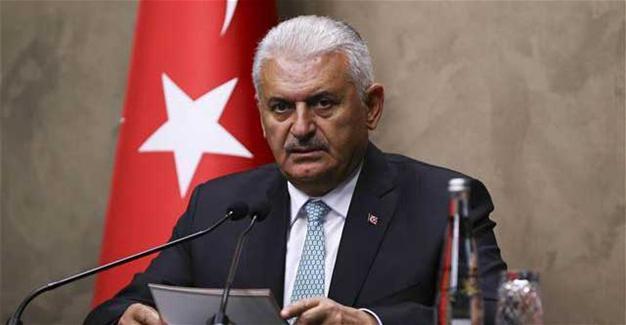Turkey furious at US decision to arm Syrian Kurdish group
ANKARA
 The Turkish government has expressed frustration over a U.S. decision to provide heavy weaponry to Syrian Kurdish militants in the battle against the Islamic State of Iraq and the Levant (ISIL), even as Washington sought to assuage Turkey’s concerns.
The Turkish government has expressed frustration over a U.S. decision to provide heavy weaponry to Syrian Kurdish militants in the battle against the Islamic State of Iraq and the Levant (ISIL), even as Washington sought to assuage Turkey’s concerns.“The U.S. administration still has the opportunity to take Turkey’s sensitivity about the terror organization PKK [Kurdistan Workers’ Party - PKK] into consideration,” Prime Minister Binali Yıldırım said May 10.
“If a negative decision is taken, its consequences will not only be against Turkey but have a negative impact on the U.S., too,” Yıldırım said.
Yıldırım’s remarks came one day after U.S. President Donald Trump authorized the arming of the Syrian Kurdish People’s Protection Units (YPG) “as necessary to ensure a clear victory” in a planned assault to retake the northern Syrian city of Raqqa from ISIL.
Ankara considers the Democratic Union Party (PYD) and its armed wing, the YPG, as “terrorist” groups linked to the PKK and has long pressed Washington to stop its support for the group.
“Turkey’s stance on this issue is very clear: We are against using a terrorist group against another terrorist group, and we have conveyed this clear message to our counterparts,” said Yıldırım.
According to Foreign Minister Mevlüt Çavuşoğlu, every weapon obtained by the YPG constitutes a threat to Turkey.
Çavuşoğlu, who was speaking to reporters on May 10 while on a visit to Montenegro, said the United States should distinguish between the YPG and their Arab allies in the Syrian Democratic Forces (SDF) alliance, and that the Arabs should be the ones to enter Raqqa.
“Both the PKK and the YPG are terrorist organizations and they are no different, apart from their names. Every weapon seized by them is a threat to Turkey,” Çavuşoğlu said.
“Within the SDF, Arabs and the YPG should be distinguished and Arab forces should be the ones entering Raqqa,” he added.
Çavuşoğlu said the U.S. was aware of Turkey’s stance and that the issues would be discussed by President Recep Tayyip Erdoğan when he meets Trump in Washington next week.
Washington, meanwhile, took a step to ease Turkey’s concerns.
Pentagon chief Jim Mattis said May 10 he was confident the U.S. could allay any concerns Turkey has over the decision.
“We will work very closely with Turkey in support of their security on their southern border,” Mattis said at a news conference in Lithuania.
“We have very open discussions about options and we will work together, we will work out any of the concerns. I am not concerned at all about the NATO alliance and the relations between our nations.”
YPG spokesman Redur Xelil, meanwhile, described the move as “somewhat late,” but would still “provide a strong impetus” to all forces fighting ISIL.
The SDF, a U.S.-backed group dominated by YPG but which also contains Arab elements, said receiving U.S. arms and military equipment would “hasten the defeat” of the jihadists.
Deputy Prime Minister Nurettin Canikli said Turkey would take the diplomatic initiative to convince Washington “to do what friendship requires.”
“The argument that a ground operation in the fight against Daesh [ISIL] would be successful with only the YPG has nothing to do with reality,” he said.
The announcement of Trump’s decision came after a high-level Turkish delegation held talks in the U.S. capital ahead of Erdoğan’s visit to the White House next week.
Chief of General Staff Gen. Hulusi Akar, presidential spokesman İbrahim Kalın and National Intelligence Agency (MİT) chief Hakan Fidan met with their counterparts, as well as H.R. McMaster, Trump’s national security adviser, to lay the groundwork for the meeting of the presidents scheduled for May 16-17.
During the meetings, the delegation tried to convince the U.S. officials to only use Arab fighters to capture Raqqa.
Turkey has said it is keen to join the battle to recapture Raqqa but on condition that the offensive does not include the YPG.
Last month, Erdoğan said that if Turkey and the U.S. joined forces, they could turn Raqa into a “graveyard” for ISIL.
On April 27, Turkish warplanes struck YPG forces in Syria and also hit Kurdish forces in neighboring Iraq in what Ankara described as “terrorist havens.”
















